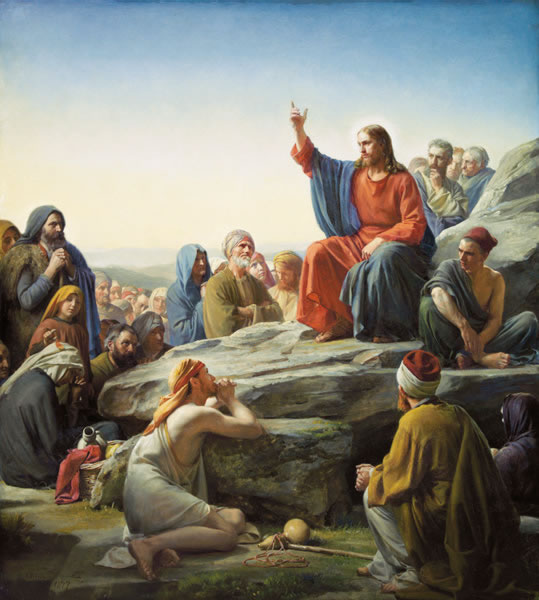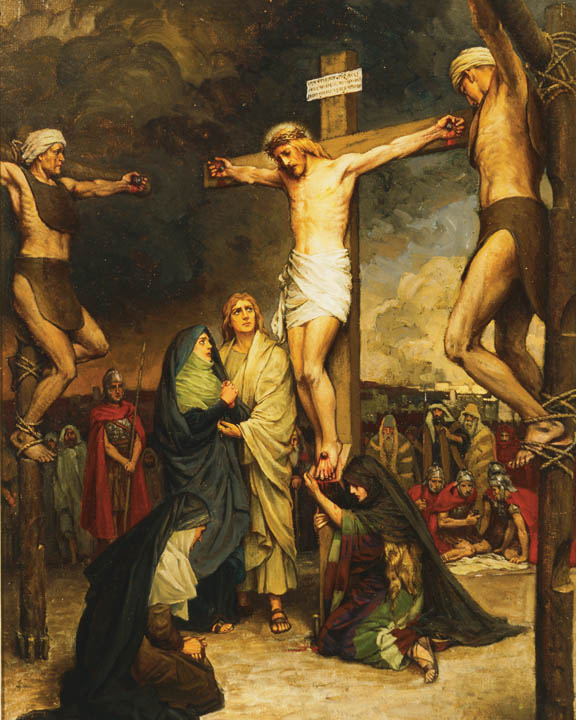Formal Church celebrations of Easter in The Church of Jesus Christ of Latter-day Saints often include an Easter program during sacrament service with special music and people speaking and/or sharing scriptures that relate to the story of Easter. Also, during the first weekend in April of each year, the LDS Church holds its Annual General Conference with many inspiring and uplifting messages from our Prophet, his two Counselors, and other General Authorities and Auxiliary Leaders of the Church about the Savior, His life, death, and resurrection — and what His Atonement means for us in our lives.
 During his earthly ministry, our Lord and Savior Jesus Christ met scores of people from many different walks of life. These people formed vital opinions that resulted in actions that would set the course of their eternal destinies. One such person was Judas Iscariot whom most of Christendom remembers as the one who betrayed the Master for the price of 30 pieces of silver. Although some may condemn Judas for his actions, what must be remembered is that even those actions played a vital part in bringing to pass the eternal plan of redemption.
During his earthly ministry, our Lord and Savior Jesus Christ met scores of people from many different walks of life. These people formed vital opinions that resulted in actions that would set the course of their eternal destinies. One such person was Judas Iscariot whom most of Christendom remembers as the one who betrayed the Master for the price of 30 pieces of silver. Although some may condemn Judas for his actions, what must be remembered is that even those actions played a vital part in bringing to pass the eternal plan of redemption.
Judas Iscariot, son of Simon, was one of the twelve apostles who walked with Jesus and listened to His teaching daily, yet he betrayed his Master into the hands of the chief priests (see Matthew 26:14, Matthew 26:47, Mark 14:10, Mark 14:42, Luke 22:1, Luke 22:47, John 13:18, John 18:1). Iscariot was not his last name. The word Iscariot is used in the Gospels to differentiate this Judas from another Judas who was the son of James, also named Thaddeus. Judas, the son of James, did not want any association with the Judas who betrayed the Son of God, thus the differentiation.
In the Greek New Testament, Judas is called Ioúdas Iskáriōth and Ισκαριώτης (Iskariṓtēs). “Judas” (spelled “Ioudas” in ancient Greek and “Iudas” in Latin, pronounced yudas in both) is the Greek form of the common name Judah (יהודה, Yehûdâh, Hebrew for “God is praised”). The Greek spelling underlies other names in the New Testament that are traditionally rendered differently in English: Judah and Jude. We also learn that Judas Iscariot was from a city in Judea, located 12 miles south of Hebron. This means he was the only apostle not from Galilee. He was from Judea.
So, who was this man named Judas Iscariot? Though he betrayed his Master, was he really the worst of men? Was it not prophesied that a friend such as he would betray the Son of God? In Psalm 41:9 we read, “Yea, mine own familiar friend, in whom I trusted, which did eat of my bread, hath lifted up his heel against me.” And in Psalm 55:12-14 we read, “For it was not an enemy that reproached me; then I could have borne it: neither was it he that hated me that did magnify himself against me; then I would have hid myself from him: but it was thou, a man mine equal, my guide, and mine acquaintance. We took sweet counsel together, and walked unto the house of God in company.” And so we learn that Jesus’ betrayer was not one who was a total stranger, but one of His chosen who walked and talked with Him daily, learned from His teachings, and even sat at the table and partook of bread with Him.
Therefore, the fact that the Savior would be betrayed was a fulfillment of prophecy. He would ensure that His disciples knew of this event which would soon occur by acknowledging the very one who would betray Him while at supper with them in the upper room. We read of this account in John 13:18-30:
I speak not of you all: I know whom I have chosen: but that the scripture may be fulfilled, He that eateth bread with me hath lifted up his heel against me. Now I tell you before it come, that, when it is come to pass, ye may believe that I am he. Verily, verily, I say unto you, He that receiveth whomsoever I send receiveth me; and he that receiveth me receiveth him that sent me. When Jesus had thus said, he was troubled in spirit, and testified, and said, Verily, verily, I say unto you, that one of you shall betray me.
Then the disciples looked one on another, doubting of whom he spake. Now there was leaning on Jesus’ bosom one of his disciples, whom Jesus loved. Simon Peter therefore beckoned to him, that he should ask who it should be of whom he spake. He then lying on Jesus’ breast saith unto him, Lord, who is it? Jesus answered, He it is, to whom I shall give a sop, when I have dipped it. And when he had dipped the sop, he gave it to Judas Iscariot, the son of Simon.
And after the sop Satan entered into him. Then said Jesus unto him, That thou doest, do quickly. Now no man at the table knew for what intent he spake this unto him. For some of them thought, because Judas had the bag, that Jesus had said unto him, Buy those things that we have need of against the feast; or, that he should give something to the poor. He then having received the sop went immediately out: and it was night.
Now there they were, gathered together at supper in the upper room. The Master arises from the table and announces that one of them was going to betray him. Naturally they were all curious as to who would ever do such a thing, but none of them would have ever suspected that Judas Iscariot would indeed be the one of whom He spoke. Even when he gets up and leaves right after Jesus makes the announcement, though it may seem obvious to us that he was the betrayer, the disciples saw him as the one with the money bag – the treasurer. They concluded in their minds that there were only two reasons he could be leaving, and neither of those reasons was that he went to betray Jesus. They thought that perhaps he was going to buy some more food, or give a gift to the poor. The thought of Judas being the betrayer never entered their minds. He was that kind of person. This was especially true in light of the fact that Jesus gave him in the Passover meal what is referred to as the “sop” – that special morsel of bread which you extend to only one person in the group, usually the person you deem to be your special friend that night. And if we were to carefully study the room assignments, we would notice that Judas was actually seated in the third position. There was John, Jesus, and Judas. Judas was in the seat of the person of honor that night. Though no one suspected him to be the one who would betray the Master, by this time Satan had entered into his heart and had taken control.
So, how much was it worth to this betrayer to betray his Master into the hands of those who would ultimately take His life by means of Roman crucifixion? What was this trusted disciple of the Master willing to give in exchange for his very soul? Was there such a price that could be paid to satisfy him? We find that even this matter would become a fulfillment of prophecy as we learn in Zechariah 11:12. “And I said unto them, if ye think good, give me my price; and if not, forbear. So they weighed for my price thirty pieces of silver.” Matthew confirms that this was indeed the price paid to Judas for betraying Jesus. We read in Matthew 26:14-16:
Then one of the twelve, called Judas Iscariot, went unto the chief priests, And said unto them, what will ye give me, and I will deliver him unto you? And they covenanted with him for thirty pieces of silver. And from that time he sought opportunity to betray him.
Mark states that the chief priests were looking for a cunning way to arrest Jesus. They decided against arresting Him during the feast because they feared the people would revolt. Instead, they chose the night before the feast to arrest Him. Not only did Judas accept a bribe of thirty pieces of silver, but he would also identify the Savior to the arresting soldiers of Caiaphas the High Priest with a kiss. Caiaphas’ soldiers would eventually turn the Savior over to the soldiers of Pontius Pilate, the governor of Rome. Pilate, being warned by his wife to have nothing to do with Jesus who was a just man and finding no fault of his own with Him, had the power to release Him. However, for the fear of the people, he released a criminal named Barabbas (ironically, meaning “chosen son of the father”), granting the desires of the crowd, and had Jesus crucified. Though he literally tried to ’wash his hands” of the matter, no amount of washing would ever erase the decision that he had made to crucify an innocent man.
What Judas did was unfathomable. He was considered to be a special friend of the Master, and to be under that kind of consideration according to the dictates of the culture was not something to be taken for granted. People really liked Judas. He was very gregarious, and he won their trust. He was one of the faithful Twelve.
 With those types of credentials, how then did he come to betray the Master? Some have suggested that perhaps it was Judas’ love of money that drove him to do what he did. Whatever the case, the life of Judas is a valuable life lesson that we as Christians can take to heart. The longer we are Christians, the easier it becomes for us at times to take the Lord for granted and to coast in our spiritual life. After a while we learn all of the correct jargon. We know what to say, how to say it, and when to say it. We have all of the correct Sunday school answers to any question that might be asked. We even know how to put on a warm smile and pretend that everything is alright. We know how to pretend very well, but on the inside we are dying. There may be secret things in our lives, like in the secret life of Judas, that have crept in that no one else knows about, but those things are hurting us and affecting our lives. Think of Judas and the warning he presents for us. It is a call for all of us to be careful about being complacent in our walk with the Savior because, like Judas, we can fall a long way, and it is hard to recover once we have fallen that far.
With those types of credentials, how then did he come to betray the Master? Some have suggested that perhaps it was Judas’ love of money that drove him to do what he did. Whatever the case, the life of Judas is a valuable life lesson that we as Christians can take to heart. The longer we are Christians, the easier it becomes for us at times to take the Lord for granted and to coast in our spiritual life. After a while we learn all of the correct jargon. We know what to say, how to say it, and when to say it. We have all of the correct Sunday school answers to any question that might be asked. We even know how to put on a warm smile and pretend that everything is alright. We know how to pretend very well, but on the inside we are dying. There may be secret things in our lives, like in the secret life of Judas, that have crept in that no one else knows about, but those things are hurting us and affecting our lives. Think of Judas and the warning he presents for us. It is a call for all of us to be careful about being complacent in our walk with the Savior because, like Judas, we can fall a long way, and it is hard to recover once we have fallen that far.
So, what happened to the thirty pieces of silver that Judas had been given? Zechariah the prophet prophesied about what would happen to the money. In Zechariah 11:13 we read; “And the Lord said unto me, cast it unto the potter: a goodly price that I was prised at of them. And I took the thirty pieces of silver, and cast them to the potter in the house of the Lord.” Matthew 27:3-8 is the fulfillment of that prophecy:
Then Judas, which had betrayed him, when he saw that he was condemned, repented himself, and brought again the thirty pieces of silver to the chief priests and elders, Saying, I have sinned in that I have betrayed the innocent blood. And they said, what is that to us? See thou to that. And he cast down the pieces of silver in the temple, and departed, and went and hanged himself.
And the chief priests took the silver pieces, and said, it is not lawful for to put them into the treasury, because it is the price of blood. And they took counsel, and bought with them the potter’s field, to bury strangers in. Wherefore that field was called, the field of blood, unto this day.
Finally, what became of the betrayer named Judas Iscariot? First let us turn to the Old Testament to learn what was prophesied about his life. In Psalm 109:6-8 we read:
Set thou a wicked man over him: and let Satan stand at his right hand. When he shall be judged, let him be condemned: and let his prayer become sin. Let his days be few; and let another take his office.
These Old Testament verses written hundreds of years before the birth and betrayal of Christ imply that the betrayer would have a short life. In fact, the New Testament tells us the Judas died shortly after the betrayal of Jesus: (1) In Matthew 27:5 are recorded these words, “And he cast down the pieces of silver in the temple, and departed, and went and hanged himself”, (2) in John 17:12 these words are recorded, “While I was with them in the world, I kept them in thy name: those that thou gavest me I have kept, and none of them is lost, but the son of perdition; that the scripture might be fulfilled”, (3) and the record states in Acts 1: 16-18, “Men and brethren, this scripture must needs have been fulfilled, which the Holy Ghost by the mouth of David spake before concerning Judas, which was guide to them that took Jesus. For he was numbered with us, and had obtained part of this ministry. Now this man purchased a field with the reward of iniquity; and falling headlong, he burst asunder in the midst, and all his bowels gushed out.”
Our Savior was betrayed by his special friend. And being guilt-ridden by what he had done, the betrayer attempts to make restitution by giving back the bounty that he had received. However, those who had hired him to perform his deed wanted nothing to do with him or with the “blood money” that they had given him. What to do with the money was now his conundrum, not theirs. As far as they were concerned, they had never seen this man and knew nothing of which he spoke. And so, in the end, he who was the betrayer became one of the betrayed. Yet, his betrayal played a necessary part in the fulfillment of the plan of redemption that bridged the gulf between sinful man and a loving Heavenly Father, thus affording us a way to return home to the loving arms of the Father who awaits us.
Everything, from the betrayal, to the arrest in the Garden, to the illegal trials, to the agonizing hours on the hill called Golgotha hanging on a cruel Roman cross, to the moment that He cried “It is finished!”, to the glorious Resurrection on the third day, were all fulfillments of prophecies of old. Yes, His friend had transgressed against Him, but isn’t it wonderful to know as the prophet of old foretold, “he was wounded for our transgressions, he was bruised for our iniquities: the chastisement of our peace was upon him; and with his stripes we are healed” (Isaiah 53:5).
Additional Resources:
Basic Mormon Beliefs and Real Mormons
Keith L. Brown is a convert to The Church of Jesus Christ of Latter-day Saints and serves as the Ward Mission Leader in the Annapolis, Maryland Ward.

